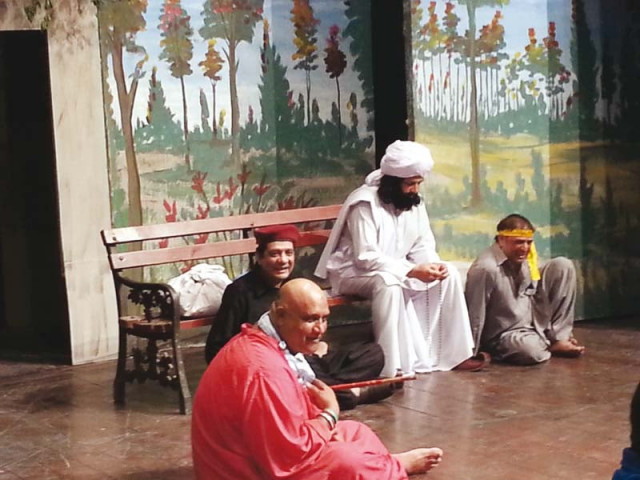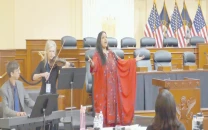When Waris Shah returned to check up on today’s Heer
A modern-day adaptation of the folklore was staged as ‘Ajj Aakhan Waris Shah Nu’ at Alhamra Arts Council

The play is written by Sufi Nisar Ahmed, who is the son of legendary Urdu poet Sufi Tabassum. PHOTOS: PUBLICITY
It was the 14th century when a girl, Heer, fell in love with someone who merely plays a flute - Ranjha. It was when people wouldn’t compromise on romance or renounce the material world in case of distress. Several poems were written down to define the epic love story that the duo shared. Among them, the most popular was ‘Heer’ by Waris Shah. Although, the actual events took place some 200 years ago in Punjab, it was the tragedy in Shah’s story that made it into a classic. According to Shah, Ranjha committed suicide after Heer was poisoned to death upon their hard-earned reunion.
Giving a fresh spin to the epic folktale, director and senior theatre actor, Khalid Moin Butt, is currently showcasing a play titled Ajj Aakhan Waris Shah Nu at al Hamra Hall, Lahore.
The play, which opened on July 1, is written by Sufi Nisar Ahmed who is the son of the legendary Urdu poet Sufi Tabassum. While Butt is playing the lead role of Waris Shah, other cast members include Sardar Kamal, Hassan Murad, Zara Akbar, Lashana, Feroza, Mujahid Rana, Jameel Bhutta, Abid Kashmiri and Nasir Kawaiti. The two-and-half hour story revolves around the renowned poet himself and how he revisits the world after his death to observe the current status of love in the society, with reference to the modern day Heer (Lashana) and Ranjha (Jameel Bhutta). However, much to his disappointment, he notes that love has lost its deep connotation. And that is evident in the part where Ranjha flees the scene after stealing Heer’s precious belongings with false promises. Shah was left wondering on how infidelity and materialism has taken a toll on the society.

Throughout the play, Heer kept on asking the poet about his logic and claims about love by reciting lines from Heer but the thwarted Shah himself was willing to eliminate those lines from his narrative. He lamented the situation while reminiscing the days when this divine feeling was free of any worldly gains. This entire scenario was such a setback for Shah’s ideology that he wished to return back to the life of the hereafter.
Although the play touched on a serious topic, it was partially kept comical to retain the audience’s attention. The dialogues were essentially reworked versions of Shah’s poems and writings and were free of vulgarity as opposed to the conventions in the commercial theater of Lahore. An interesting mix of dance performances on four different songs helped the audience take a break whenever the play seemed to drag.
Speaking to The Express Tribune, Butt said, “I selected this particular platform to stage the play because I wanted to give a healthy and constructive environment for entertainment to the theater enthusiasts. Waris Shah was a Sufi poet and our literature is rich due to poems such as Heer. So, promoting his vision is our responsibility.”
The play is a good initiative to retain the commercial theatre culture during Ramazan. It will continue throughout the month till Chaand Raat.
Published in The Express Tribune, July 3rd, 2015.
Like Life & Style on Facebook, follow @ETLifeandStyle on Twitter for the latest in fashion, gossip and entertainment.



















COMMENTS
Comments are moderated and generally will be posted if they are on-topic and not abusive.
For more information, please see our Comments FAQ